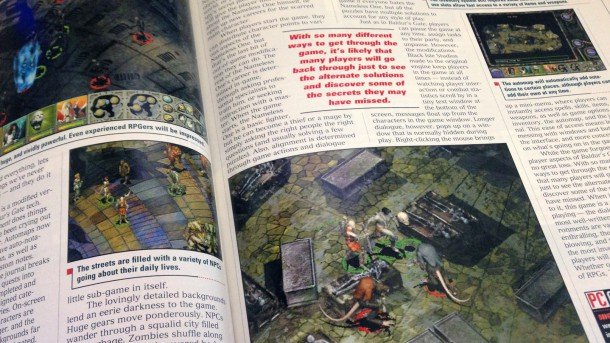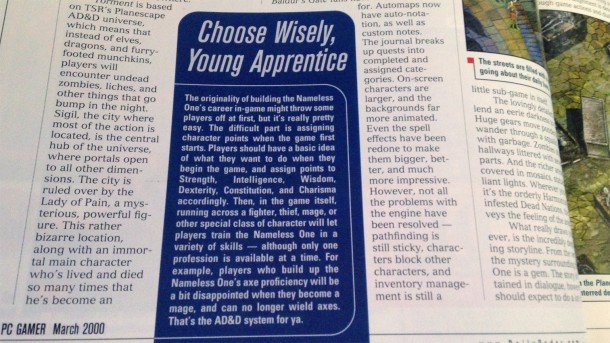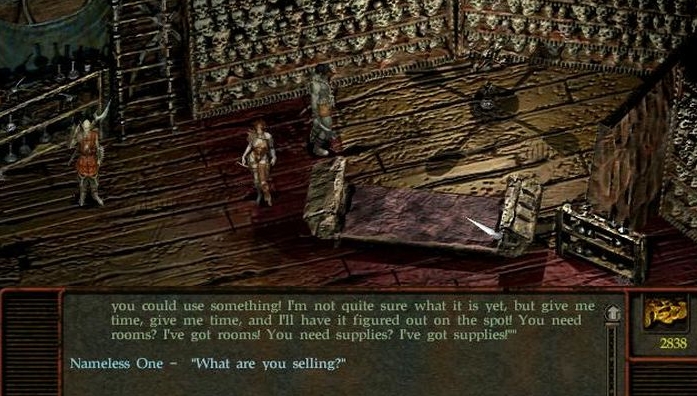Our Verdict
Torment is one of the most inventive, entertaining RPGs ever created.
PC Gamer's got your back
Tyler Wilde provides context and commentary followed by the full, original text of our Planescape: Torment review, originally published in the March 2000 issues of the US edition.
We recently named Planescape: Torment the best RPG of all time, and our original review confirms that we felt much the same way 14 years ago. Torment was good then, and remains great—and lucky for us, it's available on GOG. Thank you, you beautiful Polish preservers of PC gaming history.
Planescape: Torment review
Black Isle Studios delivers an enthralling adventure through some of the most wondrous RPG realms ever encountered.
It's difficult not to make the obvious jokes about waking up in the middle of a mortuary with a splitting headache and no memory of who or what you are. Granted, anyone who's ingested a bit too much of the sauce can identify with the feeling, but in this case, the occasion that results in the said circumstance isn't a long night of booze, but death. You see, that's what happens when you're an immortal.
That's the opening of Interplay's Planescape: Torment—players take on the role of the Nameless One, a creature who awakes one day with no memory or even any idea of who or what he is. After a floating, talking skull initiates a conversation, the Nameless One discovers a cryptic message carved into his back—apparently it's a note to himself. And with that, players have to make their way out of the macabre mortuary and into the labyrinths of Sigil, a city of darkness, magic, and portals that lead everywhere and nowhere.

Torment is based on TSR's Planescape AD&D universe, which means that instead of elves, dragons, and furry-footed munchkins, players will encounter undead zombies, liches, and other things that go bump in the night. Sigil, the city where most of the action is located, is the central hub of the universe, where portals open to all other dimensions. The city is ruled over by the Lady of Pain, a mysterious, powerful figure. This rather bizarre location, along with an immortal main character who's lived and died so many times that he's become an expert at anything and everything, lets the developers do things we've never seen before in an RPG—and they do it incredibly well.
Keep up to date with the most important stories and the best deals, as picked by the PC Gamer team.
The game engine is a modified version of Bioware's Baldur's Gate tech. Although similar, Torment does things Baldur's Gate fans have been crying out for. Automaps now have auto-notation, as well as custom notes. The journal breaks up quests into completed and assigned categories. On-screen characters are larger, and the backgrounds far more animated. Even the spell effects have been redone to make them bigger, better, and much more impressive. However, not all the problems with the engine have been resolved—pathfinding is still sticky, characters block other characters, and inventory management is still a little sub-game in itself.
The lovingly detailed backgrounds lend an eerie darkness to the game. Huge gears move ponderously. NPCs wander through a squalid city filled with garbage. Zombies shuffle along hallways littered with severed body parts. And the richer areas of town are covered in mosaics, statues, and brilliant lights. Wherever you go, whether it's the orderly Harmonium or undead-infested Dead Nations, the artwork conveys the feeling of the area perfectly.

What really draws you in, however, is the incredibly deep and involving storyline. From the very beginning, the mystery surrounding the Nameless One is a gem. The story is mostly contained in dialogue, however, so players should expect to do a lot of reading, especially in the first few hours, when the entire Hive neighborhood lies open and just about every NPC with a name has some quest for you.
While most of the quests are fetch-and-carry jobs, they have some of the most interesting storylines. The Nameless One might be pursuing objects that have severe impact on the world, or perhaps just uncovering a spy's secret plot. Most quests, however, will give the player more information on the Nameless One himself, or open up new careers for the scarred main character.
When players start the game, they can distribute character points to various aspects of the Nameless One, but that's the last bit of out-of-game modification they can do. The rest of the Nameless One's career is determined in-game, through asking professional specialists to train him, or seeking instruction with a master. When the game starts, the Nameless One is a basic fighter, but he can become a thief or a mage by simply asking the right people the right questions (and usually solving a few puzzles). Also, alignment is determined through game actions and dialogue choices—players can choose to be a nice guy most of the time, or a total asshole to everyone they meet, and the alignment will change accordingly. What's even better, though, is that no matter what alignment players choose, there's a way to get through the game. It might be more difficult to get through the game if everyone hates the Nameless One, but all the puzzles have multiple solutions to account for any style of play.

Just as in Baldur's Gate, players can pause the game at any time, assign tasks to their party, and unpause. However, the modifications Black Isle Studios made to the original engine keep players in the game at all times—instead of watching player interaction or combat statistics scroll by in a tiny text window at the bottom of the screen, messages float up from the characters in the game window. Longer dialogue, however, pops up on a window that is normally hidden during play. Right-clicking the mouse brings up a mini-menu, where players can instantly access spells, skills, items, weapons, as well as game options, inventory, the automap, and the journal. This ease of access means less time messing with windows and buttons in the interface, and more concentration on what's going on in the game.
While the game foregoes the multiplayer aspects of Baldur's Gate, this is no great loss. With so many different ways to get through the game, it's likely that many players will go back through just to see the alternate solutions and discover some of the secrets they may have missed. When it comes right down to it, this game is a masterpiece of roleplaying—the dialogue is some of the most well-written of any RPG, the environments are varied and downright enthralling, the spell effects are mindblowing, and the story contains some of the most inventive, unique characters players will ever have in a party. Whether or not you're a hardcore fan of RPGs, this Torment is a must-have. — Michael Wolf
Torment is one of the most inventive, entertaining RPGs ever created.
PC Gamer is the global authority on PC games—starting in 1993 with the magazine, and then in 2010 with this website you're currently reading. We have writers across the US, Canada, UK and Australia, who you can read about here.



